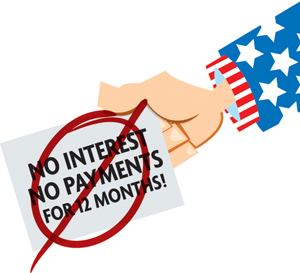Pool and spa retailers soon could be forced to ditch a popular sales and marketing tool.
Regulations passed in December 2008 by the Federal Reserve threaten to eliminate the so-called “same-as-cash” deferred interest programs. These plans often are used by consumers when purchasing big-ticket items such as hot tubs.
“You offer the program for your salespeople,” said Alice Cunningham, co-owner of Olympic Hot Tub Co. in Seattle. “Promotions like these are one way to help get your staff excited. … That 12-month financing is such a carrot.”
Though the rule change doesn’t take effect until July 1, 2010, some pool and spa retailers already have begun altering their programs in preparation for the deadline, according to industry sources.
“We had known the Fed was working on this issue,” said J. Craig Shearman, vice president of government affairs at the National Retail Federation in Washington, D.C. “So we expected regulations that would … address things like double-cycle billing and changing interest rates.
“But we certainly didn’t expect them to throw the baby out with the bath water.”
In February, NRF sent a letter to Sen. Christopher Dodd (D-Conn.) chairman of the Senate Committee on Banking, Housing and Urban Affairs. In it, the group requested that the committee reconsider the Fed’s ban, and look for a better alternative. (To view the letter, log onto psn.aqi-psn.prd.zonda.onl.)
For its part, the Fed could decide to modify the regulations if a compelling enough argument is made against them. Alternatively, Congress could pass legislation to override the Fed’s policy.
Meanwhile, Manuel J. Perez de la Mesa, CEO of PoolCorp in Covington, La., assessed the situation as yet another example of administrative interference.
“The federal government is trying to fix a problem they largely caused and, in the process, they’re causing more problems,” Perez de la Mesa said. “Before things get too bad, someone needs to light a candle in Washington and make them realize they should stay out of the way. They’re dealing so much in the dark over there.”
Others wondered if the pool and spa industry has done enough to represent its retail members in the nation’s capital.
“We’re extremely concerned about legislation like this and the impact it could have on our retailers’ ability to sell hot tubs and other big-ticket products,” said Thomas Brown, executive vice president of Aquatech Corp., a buying group representing 240 retail locations throughout the country. “We were just hoping [industry groups] would have put up a front against it.”
In mid-March, the Association of Pool & Spa Professionals sent a letter of support to NRF in which it expressed concern for its members who rely on same-as-cash financing. As of early April, APSP had not received a response from NRF.
“It is unfortunate that a financial tool that is used by many retailers inside our industry and outside is being taken away,” said Bill Weber, APSP president/CEO, in a written statement.
“Through conversations with staff at the National Retail Federation, APSP is aware of actions that the NRF is taking on parallel tracks to counter this action.”


